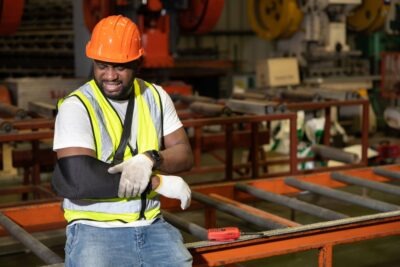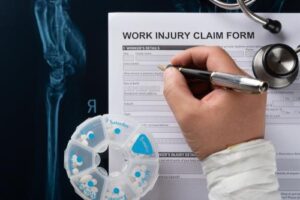
Construction work is one of the most physically demanding and dangerous jobs in Georgia. That is why we’ve created this construction workers’ guide to workers’ compensation in Georgia, which includes tips on reporting the injury promptly, seeking medical attention, and filing a claim for benefits to cover your lost wages and treatment costs.
Unfortunately, workplace injuries are common, and when they happen, you deserve support. Workers’ compensation is designed to provide injured workers with financial assistance while they recover.
If you’ve been hurt on the job, contact a Georgia workers’ compensation lawyer today for a free consultation.
Understanding Workers’ Compensation in GA
Workers’ compensation is a system that provides medical care and wage replacement to employees who are injured while performing their job duties. It exists to protect both workers and employers.
For injured construction workers, this system can help cover the cost of treatment, lost income, pain and suffering, and rehabilitation.
The process may sound straightforward, but securing benefits isn’t always easy. Claims can be delayed, denied, or underpaid. That’s why it’s important to know your rights and partner with a workers’ compensation lawyer in Georgia as soon as possible.
Get the strong arm
Common Construction Injuries Covered by Workers’ Compensation
Construction sites are full of hazards. Even with proper training and safety gear, accidents can happen in an instant. Workers’ compensation typically covers injuries such as:
- Falls from scaffolding or ladders: These often lead to broken bones, spinal damage, or traumatic brain injuries.
- Electrocution: Contact with exposed wiring or live electrical systems can cause serious burns or cardiac trauma.
- Heavy machinery accidents: Forklifts, cranes, and bulldozers can cause crushing injuries, amputations, or fatalities.
- Repetitive strain injuries: Lifting and repetitive movements can lead to long-term damage like tendonitis or back problems.
- Falling objects: Tools or materials dropped from above can result in head and neck injuries.
- Slip and falls: Uneven surfaces, slick flooring, or debris on the ground can cause fractures or concussions.
If you suffered any injury while performing your job duties, workers’ compensation should apply regardless of who was at fault.
What to Do After a Construction Injury
If you’re hurt on the job, your actions immediately after the accident can significantly impact your claim. Follow these essential steps:
1. Report the Injury Promptly
Notify your supervisor or site manager about your injury as soon as possible. Don’t wait. Reporting it late can complicate or jeopardize your claim.
2. Seek Medical Attention
Even if your injury seems minor, get it evaluated by a medical professional. Be sure to tell the doctor the injury happened at work and follow all prescribed treatments and follow-up appointments.
3. Document Everything
Keep detailed records of what happened, who witnessed the incident, your symptoms, and your medical visits. Take photos if applicable, and keep copies of any paperwork.
4. File a Workers’ Compensation Claim
Your employer should provide the necessary forms or guide you through the process. If they don’t, or if you’re unsure how to proceed, a workers’ compensation lawyer can help you take the next step.
Benefits You May Be Eligible to Receive
Depending on the nature and severity of your injury, workers’ compensation in Georgia may provide several types of benefits:
- Medical coverage: This includes hospital bills, physical therapy, medications, and other necessary treatments related to your injury.
- Wage replacement: If you’re unable to work while you recover, you may receive a portion of your average weekly wages.
- Temporary or permanent disability benefits: If your injury causes short-term or long-term impairment, you may qualify for additional compensation.
Every case is unique, and the amount and duration of benefits vary. Getting professional legal help can ensure you’re not leaving money on the table.
Challenges You Might Face with a Claim
Although the workers’ compensation system is meant to help injured workers, it doesn’t always function as smoothly as it should. Construction workers may face issues such as:
- Delayed approval: Some claims take weeks or months to be processed.
- Claim denials: Employers or insurers may dispute that your injury occurred at work or argue that it wasn’t severe enough to qualify.
- Pressure to return to work early: You might be encouraged to resume duties before you’ve fully healed.
- Limited medical options: You may be required to see a doctor chosen by your employer or insurer.
If you face any of these obstacles, you don’t have to go through it alone. The legal team at John Foy & Associates can stand up for your rights and make sure you’re treated fairly.
When to Call a Workers’ Compensation Lawyer
Many construction workers don’t realize they can speak to a lawyer even before filing a claim. Here are some signs it’s time to call a workers’ compensation attorney:
- Your claim was denied or underpaid.
- You’re being pressured to return to work too soon.
- Your medical treatment is being limited or denied.
- You have a permanent injury that could impact your future employment.
- You’re not sure what benefits you’re entitled to.
We offer free consultations, so there’s no fee to discuss your case with our team. Don’t wait until it’s too late; contact our workers’ compensation attorneys in Georgia today.
Get the Help You Deserve by Calling the Georgia Workers’ Compensation Lawyers at John Foy & Associates
We hope you learned something from our construction workers’ guide to workers’ compensation in Georgia. Remember, if you’ve been injured working construction in Georgia, don’t wait. The sooner you take action, the better your chances of receiving full compensation.
At John Foy & Associates, we’ve been Fighting and Winning for 25 Years, and we’re ready to help you take the next step. Contact us today for a free consultation. Let us fight for your future while you focus on recovery.
Check out our blog for more information.
(404) 400-4000 or complete a Free Case Evaluation form





